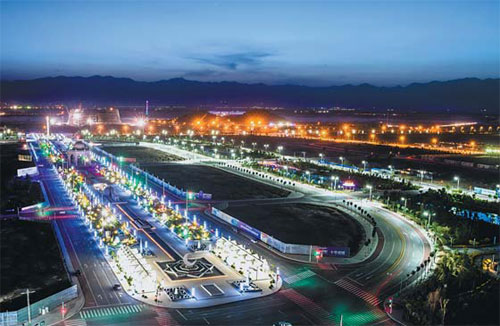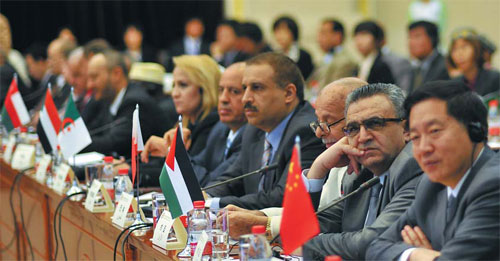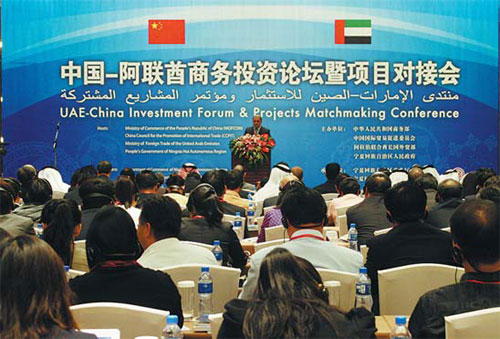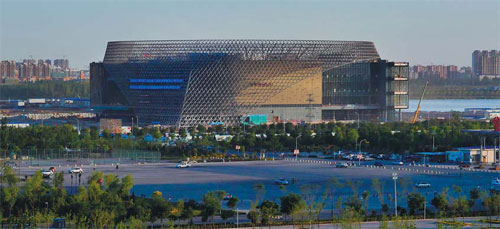EXPO a window to expand trade with arab world
Cultural, religious links give region advantages in promoting exchanges
Ma Youming, the production manager of Ningxia Yijia National Costumes, a manufacturer of Muslim clothing and textiles in Northwest China's Ningxia Hui autonomous region, sees the upcoming China-Arab States Expo as a major platform to boost his company's sales.
While it is unlikely to help alleviate pressing issues the company is facing, such as rising labor costs and difficulty attracting investments, Ma said he hopes the expo will bring him closer to potential clients for marketing purposes and drive up the company's exports to the Arab markets.
One major product of the company is the taqiyah, a short, rounded skullcap worn by many Muslim men, Ma said.
"With the help of the expo, we aim to achieve total production of 50 million Muslim caps this year and boost sales to about 200 million yuan ($32 million)," he said, noting that his company supplies more than 50 percent of taqiyahs in the world and Saudi Arabia is its top export destination.
Ma's company is among many from China and Arab countries that are looking for business opportunities from the four-day expo, which will open on Thursday in Yinchuan, capital of Ningxia.
More than 100 business and investment deals are expected to be signed during the expo, according to the official press release.
Jointly held by the Ministry of Commerce, the China Council for the Promotion of International Trade and the Ningxia regional government, the biennial event will serve as a high-end trade and investment platform for Chinese businesspeople and their counterparts from Arab countries in fields including agriculture, energy, tourism, healthcare, finance, e-commerce and new technology.
It will also provide a space for dialogue between political leaders to discuss cooperation between China and Arab countries in the context of Beijing's ambitious plan to revive the ancient land-based and maritime silk roads, known as the Belt and Road Initiative.
Local authorities aim to use the expo as a catalyst to further open Ningxia, a remote inland region, and turn it into a springboard for China's trade and exchanges with Arab countries.
"Ningxia can serve as a window for China to expand its contact with the Arab world," said Li Jianhua, Party head of Ningxia. "The expo will provide such a platform for business, diplomatic and cultural exchanges between the two sides."
Trade between China and Arab nations reached $251.2 billion last year, up 5.2 percent from the previous year, according to the Ministry of Commerce.
China has become the second-largest trading partner for Arab countries and the most important export market of crude oil. Arab countries are also a major market for construction projects by Chinese companies and key suppliers of energy and natural resources to China.
President Xi Jinping has set the goal of boosting China-Arab trade value to $600 billion by 2023.
Ningxia is home to more than 2.3 million Hui people, a majority of whom are practitioners of Islam, according to official figures. The cultural and religious links give Ningxia a natural advantage to forge strong ties with the Arab world, Li said.
The Arab world comprises 22 countries and territories of the Arab League and holds a combined population of about 422 million people.
Zhang Liwei, deputy head of the Ningxia Expo Bureau, the administrative body of the expo, said the event will help boost the profile of Ningxia as a gateway from China to the Arab world and transform the local economy from being resource-based to service-oriented.
Ningxia, heavily dependent on coal production, has been hit by a slump in coal prices amid the country's economic slowdown and shrinking industrial demand. The trend has forced local authorities to seek new growth engines.
"The service sector will be a focus of Ningxia's future development," Zhang said.
"Given its geographic location in Northwest China, Ningxia will be a strategically important place along the Silk Road and has the ambitious plan to develop into a center for services such as logistics, cross-border trade settlements and e-commerce."
Meanwhile, major industrial parks are being constructed in Ningxia with initial investment exceeding 20 billion yuan, said Zhang.
"So far, we have received very active and positive response from Arab nations."
Jordan has been invited as the expo's guest country of honor and its top officials in charge of agriculture, technology and education are expected to attend. Egypt has been selected as the next guest country for the 2017 expo, Zhang said.
In 2012, the State Council approved Ningxia as a pilot region for the opening of the country's western inland economy. Two years later, Yinchuan the capital city established a center of information technology, biotechnology and application for intellectual property rights.
More than 380 companies from big data, e-commerce, the Internet of things and cloud computing sectors have settled in the center, according to local officials.
The cross-border e-commerce business is also developing rapidly in Ningxia, with the value of online transactions exceeding 460 billion yuan by the end of last year.
Ningxia began hosting the China-Arab States Economic and Trade Forum in 2010. With the approval of the State Council, the forum was upgraded and renamed the China-Arab States Expo last year.
Contact the writers through lixiang@chinadaily.com.cn
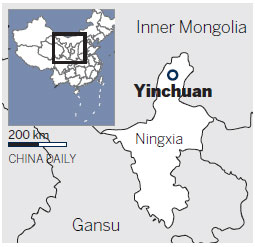
|
Night view of Yinchuan, Ningxia Hui autonomous region, the permanent host city of the China-Arab States Expo. This year's expo will kick off on Thursday. Photos provided to China Daily |
|
Government officials and businesspeople from China and Arab countries attend the expo in 2013. |
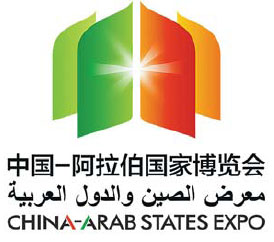
|
The UAE-China Investment Forum and Projects Matchmaking Conference at the expo in 2013. |
|
The newly built Ningxia International Conference Center, a landmark in Ningxia, is the host venue for the expo. wu heng / for China Daily |
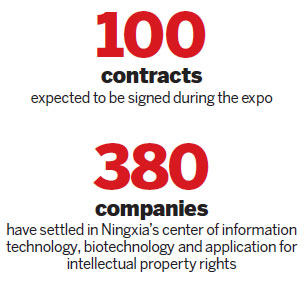
(China Daily 09/09/2015 page6)
